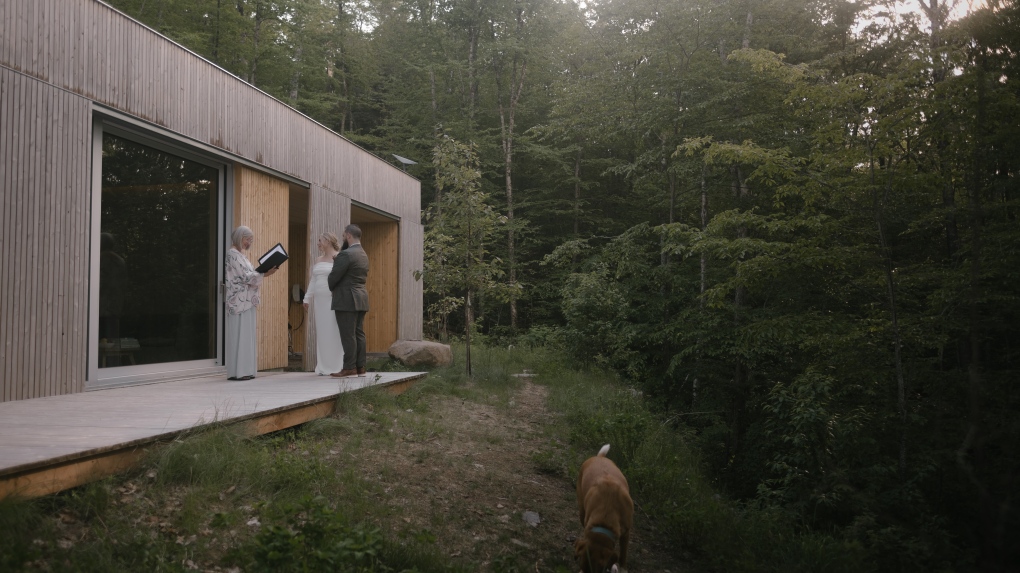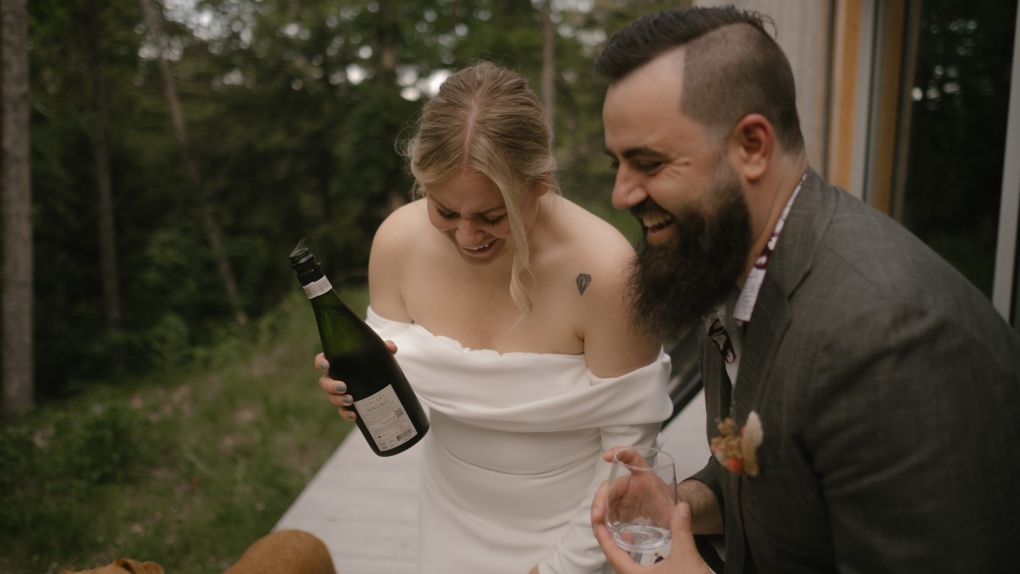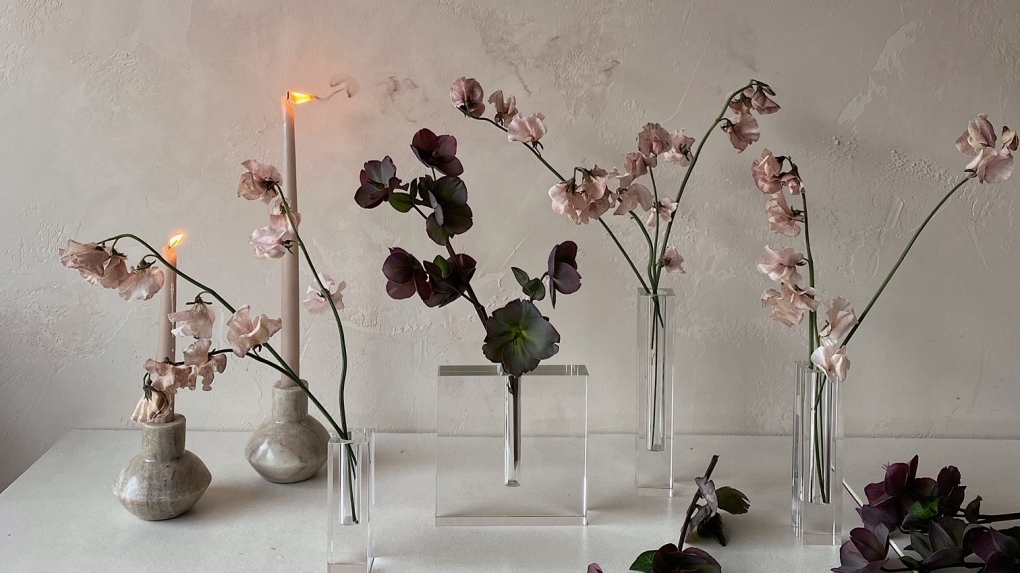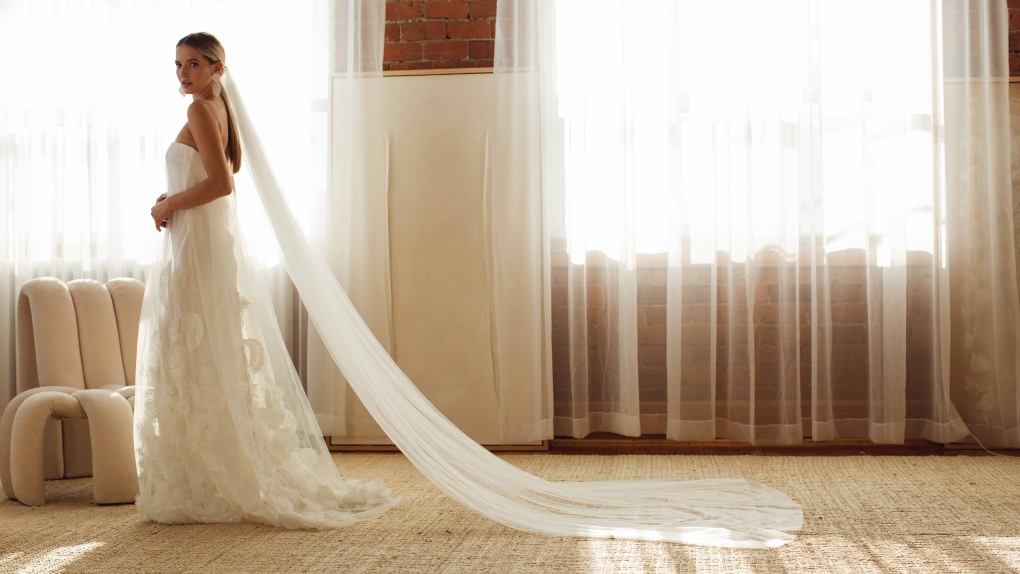Rebelling against wedding norms is the manifesto for 'anti-brides' — and the movement is growing
A Toronto newly-wed cut rings, vows, and even guests from her serene forest ceremony, joining a movement of anti-brides spearheading a rebellion in an industry steeped in tradition.
“There is something about the word [bride] that feels a bit archaic,” Natalie Sorichetti told CTV News Toronto.
 A Toronto couple gets married in a forest with no guests, apart from their dog (Photo credit: Kristina Bastien).Anti-brides, like Sorichetti, refuse to conform to wedding norms and outdated traditions. “It was in the woods, no one could find us, no one could see us,” she said, describing her wedding day just over a year ago.
A Toronto couple gets married in a forest with no guests, apart from their dog (Photo credit: Kristina Bastien).Anti-brides, like Sorichetti, refuse to conform to wedding norms and outdated traditions. “It was in the woods, no one could find us, no one could see us,” she said, describing her wedding day just over a year ago.
“It’s kind of a generation shift of individuals saying, ‘Hey, the traditional definition of a bride and everything that goes along with being a bride doesn’t really stand true anymore.’”
Sorichetti isn’t alone. The search term “anti-bride wedding” surged by 490 per cent on Pinterest year-over-year, according to a 2023 trends report. Searches for “nontraditional wedding dresses” increased 110 per cent and “untraditional engagement rings” went up 2,145 per cent since 2022.
“Now more than ever, people are looking for ways to make their wedding days stand out and be true to their own aesthetic, versus following a one-size-fits-all approach,” Swasti Sarna, global director of data and insights at Pinterest, said.
 A newly-wed celebrates wearing a Bon Bride dress from Loversland (Photo credit: Kristina Bastien).While authenticity has fuelled the anti-bride, budget has too. The average wedding in Canada now costs upwards of $32,000, according to Michelle Bildeau, co-author of “The New Wedding Book.”
A newly-wed celebrates wearing a Bon Bride dress from Loversland (Photo credit: Kristina Bastien).While authenticity has fuelled the anti-bride, budget has too. The average wedding in Canada now costs upwards of $32,000, according to Michelle Bildeau, co-author of “The New Wedding Book.”
Sandy Yong, a personal finance author in Toronto, notes less traditional weddings can save on the bottom line. “I think people are really figuring out what’s more important to them and cutting out all the excess,” she said.
While Bildeau acknowledged cost cuts could be contributing to the trend – “I also think people do not want the pressures of a traditional wedding, or they may not see themselves represented,” she added.
NEW TRADITION
Breaking away from more traditional bouquets was a hard sell when Toronto florist Jordana Masi founded White Oak Flower Co. seven years ago.
“Everybody was really attached to big ball hydrangeas,” Masi, who has worked with flowers since she was 15, said. “When I started my business, it was mostly because I had that vision of doing something different.”
Her flowers are whimsical, yet modern; wild, yet clean. “I’m a maximal minimalist,” as Masi put it. “But in the last five years, there’s been a lot more art-based florists coming out.”
Like Masi, Danielle Gulic and Yvonne Reidy noticed a void in the industry nearly 10 years ago.
 Whimsical wedding flowers created by White Oak Flower Co. (Jordana Masi).“A lot of our friends started to get married and it seemed like what was available in the marketplace needed an update, needed something a little more contemporary to relate to the contemporary bride, and also couples,” Gulic, who co-founder Loversland with Reidy in 2014, said.
Whimsical wedding flowers created by White Oak Flower Co. (Jordana Masi).“A lot of our friends started to get married and it seemed like what was available in the marketplace needed an update, needed something a little more contemporary to relate to the contemporary bride, and also couples,” Gulic, who co-founder Loversland with Reidy in 2014, said.
They created a brick-and-mortar shop on Ossington Avenue in Toronto, dispelling the traditional appointment-only model of dress shops and bringing in small batch designs from New Zealand, France and New York.
In a haven nestled in the back of the store, plunging open backs and silk spaghetti straps hang on just a couple of curated racks.
“When we first opened we had a lot of – I don’t want to say pushback – but a lot of people saying these are not wedding dresses,” Gulic said.
“Having just a bias cut beautiful silk number was really outside the box for a lot of people. It did take time,” she added.
 An anti-bride wears a dress from Loversland, a brick-and-mortar love lifestyle store in Toronto (Loversland). In that time, the anti-bride took shape. “Is it trendy to be an anti-bride now? Perhaps,” Gulic said. “But is it now the new tradition?”
An anti-bride wears a dress from Loversland, a brick-and-mortar love lifestyle store in Toronto (Loversland). In that time, the anti-bride took shape. “Is it trendy to be an anti-bride now? Perhaps,” Gulic said. “But is it now the new tradition?”
From Sorichetti’s perspective, the anti-bride is a starting point. “I think in another 10 years from now, maybe the term bride doesn’t exist in the same capacity,” she said.
CTVNews.ca Top Stories

Work stoppage possible as WestJet issues lockout notice to maintenance engineers' union
A lockout notice issued by WestJet to a union representing aircraft maintenance engineers could result in a work stoppage next week.
'I just can't believe that it took so long': Body found in wreckage 3 months after deadly fire
A man accused of arson in a January Old Strathcona apartment fire is expected to be charged with manslaughter after a body was discovered in the burned building late last month.
No proof man lied to brother about number of kittens born in litter, B.C. tribunal rules
A man was denied a $5,000 payout from his brother after a B.C. tribunal dismissed his claim disputing how many kittens were born in a litter.
Bodies recovered in Mexico likely 2 Australians, 1 American who went missing: officials
Three bodies recovered in an area of Baja California are likely to be those of the two Australians and an American who went missing last weekend during a camping and surfing trip, the state prosecutor’s office said Saturday.
BREAKING London Drugs begins 'gradual reopening' on 7th day after cyberattack
Almost a week after all London Drugs stores across Western Canada abruptly closed amid a cyberattack, they began a "gradual reopening" on Saturday.
Quebec police hand out hundreds of tickets to Hells Angels and other bikers before 'first run' meeting
Quebec provincial police handed out hundreds of fines to Hells Angels members and other supporting motorcycle clubs who met for their 'first run' in a small town near Sherbrooke, Que.
Auston Matthews skates ahead of Game 7, status unclear with season on the line
Auston Matthews was back on the ice with his teammates Saturday.
Russia puts Ukrainian President Zelenskyy on its wanted list
Russia has put Ukrainian President Volodymyr Zelenskyy on its wanted list, Russian state media reported Saturday, citing the interior ministry’s database.
Snakes almost on a plane: U.S. TSA discovers a bag with small snakes in passenger's pants
According to an X post by the Transportation Security Administration, officers at the Miami International Airport found the small bag of snakes hidden in a passenger's trousers on April 26 at a checkpoint.































